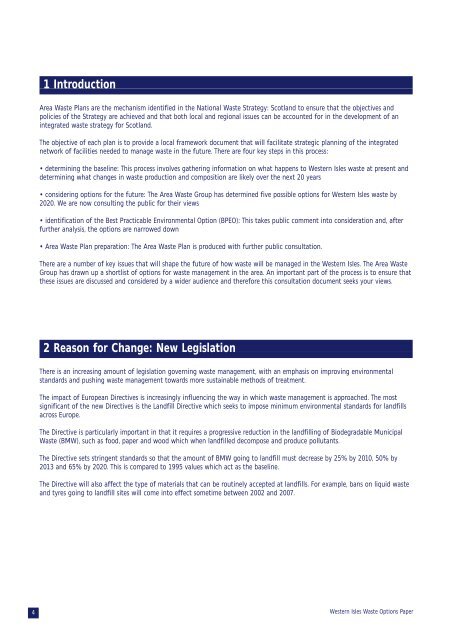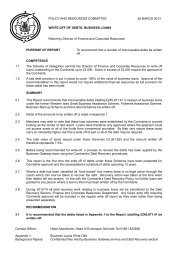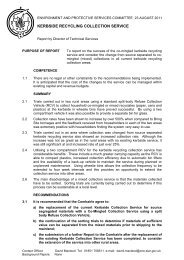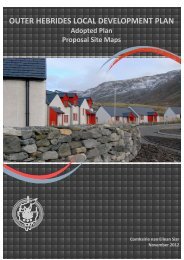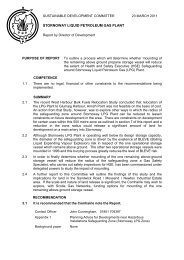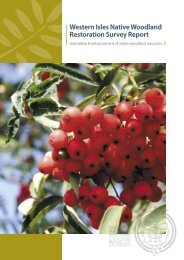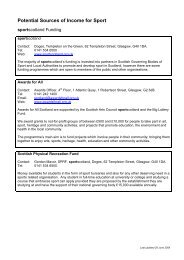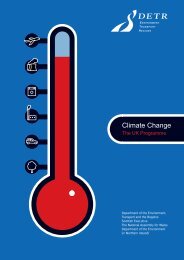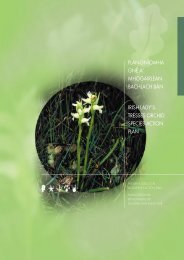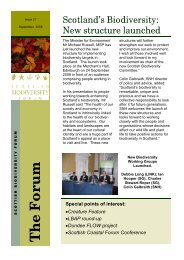Waste Management Strategy - Comhairle nan Eilean Siar
Waste Management Strategy - Comhairle nan Eilean Siar
Waste Management Strategy - Comhairle nan Eilean Siar
Create successful ePaper yourself
Turn your PDF publications into a flip-book with our unique Google optimized e-Paper software.
1 Introduction<br />
Area <strong>Waste</strong> Plans are the mechanism identified in the National <strong>Waste</strong> <strong>Strategy</strong>: Scotland to ensure that the objectives and<br />
policies of the <strong>Strategy</strong> are achieved and that both local and regional issues can be accounted for in the development of an<br />
integrated waste strategy for Scotland.<br />
The objective of each plan is to provide a local framework document that will facilitate strategic planning of the integrated<br />
network of facilities needed to manage waste in the future. There are four key steps in this process:<br />
• determining the baseline: This process involves gathering information on what happens to Western Isles waste at present and<br />
determining what changes in waste production and composition are likely over the next 20 years<br />
• considering options for the future: The Area <strong>Waste</strong> Group has determined five possible options for Western Isles waste by<br />
2020. We are now consulting the public for their views<br />
• identification of the Best Practicable Environmental Option (BPEO): This takes public comment into consideration and, after<br />
further analysis, the options are narrowed down<br />
• Area <strong>Waste</strong> Plan preparation: The Area <strong>Waste</strong> Plan is produced with further public consultation.<br />
There are a number of key issues that will shape the future of how waste will be managed in the Western Isles. The Area <strong>Waste</strong><br />
Group has drawn up a shortlist of options for waste management in the area. An important part of the process is to ensure that<br />
these issues are discussed and considered by a wider audience and therefore this consultation document seeks your views.<br />
2 Reason for Change: New Legislation<br />
There is an increasing amount of legislation governing waste management, with an emphasis on improving environmental<br />
standards and pushing waste management towards more sustainable methods of treatment.<br />
The impact of European Directives is increasingly influencing the way in which waste management is approached. The most<br />
significant of the new Directives is the Landfill Directive which seeks to impose minimum environmental standards for landfills<br />
across Europe.<br />
The Directive is particularly important in that it requires a progressive reduction in the landfilling of Biodegradable Municipal<br />
<strong>Waste</strong> (BMW), such as food, paper and wood which when landfilled decompose and produce pollutants.<br />
The Directive sets stringent standards so that the amount of BMW going to landfill must decrease by 25% by 2010, 50% by<br />
2013 and 65% by 2020. This is compared to 1995 values which act as the baseline.<br />
The Directive will also affect the type of materials that can be routinely accepted at landfills. For example, bans on liquid waste<br />
and tyres going to landfill sites will come into effect sometime between 2002 and 2007.<br />
4<br />
Western Isles <strong>Waste</strong> Options Paper


